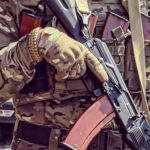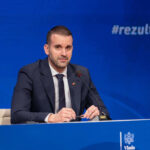- Serbia’s People’s Assembly holds its constitutional inaugural session
The mandates of all 250 deputies of the new convocation have been confirmed and the elected representatives took their oath. After that, the parliamentary session, which lasted about half an hour, completed.
Due to accusations of election fraud, part of the opposition took the oath in the parliament’s hallway instead of the session hall. None of the newly elected opposition MPs gave up their mandate.
Thus, for now, it can be stated that the Serbian opposition has given up the fight to declare the December 17 parliamentary elections invalid.
- European Parliament calls for international probe into violations of parliamentary, local elections in Serbia
The European Parliament backed a resolution calling for an independent international investigation into irregularities in December’s parliamentary and local elections in Serbia, with a particular focus on the elections held in Belgrade, where the largest number of violations were recorded. The EP calls on the European Commission to immediately start a review of the funds provided to the Serbian government under the Instument for Pre-Accession Assistance III (IPA III) and other financial instruments, and to suspend funding if Serbian authorities are not ready to implement key recommendations related to the elections or if an international investigation proves they were directly involved in election fraud.
Belgrade saw the decision made by the European Parliament almost as a declaration of war. Serbian government leaders drew parallels with the start of World War I, comparing the European Parliament’s resolutions to Austria-Hungary’s ultimatum put forward to Serbia 110 years ago, after Bosnian Serb Gavrilo Princip assassinated the Austrian Archduke and when Serbian authorities agreed to everything but an international investigation into the terrorist attack. Similar statements were made by the Prime Minister of Serbia, Ana Brnabić, and the head of the ruling Serbian Progressive Party (SNS), Deputy Prime Minister and Minister of Defense Miloš Vučević. The latter bluntly stated that the call for an international investigation in connection with the election results resembles the “1914 ultimatum”.
The dispute between the current government of Serbia and EU bodies testifies to systemic contradictions between Belgrade and Brussels. The conflict will be spreading and deepening until the top leadership in Serbia becomes more pro-European or more pro-Serbian politicians emerge in EU bodies.
- UN Security Council holds emergency meeting on Kosovo
The meeting was convened at Serbia’s request after the Central Bank of Kosovo passed a decree stating that from February 1, 2024, the euro became the only currency allowed for cash transactions, while the use of the Serbian dinar for these purposes shall be prohibited.
The Feb 8 meeting was attended by Serbian President Aleksandar Vučić and Prime Minister of Kosovo, Albin Kurti.
Addressing the United Nations Security Council, Vučić stated that snubbing the dinar aims to make life unbearable for the Serbian minority, which is being pushed out of the country. This is “nothing but yet another move in a series of persecution efforts, a systematic and large-scale attack on the Serbian population,” the president claimed.
He was echoed by Russia’s deputy ambassador, Dmitry Polyansky, who accused Kosovo of organizing “anti-Serbian terror” and trying to get rid of the “non-Albanian population.”
The prime minister of Kosovo, in turn, emphasized the statements that “Kosovo is conducting a campaign of ethnic purges or persecution of the Serbian community are lies.” The decision by the Central Bank of Kosovo “does not prohibit or prevent the government of Serbia from providing financial support to the Kosovo Serbs,” but is directed against organized crime, arms trafficking, and money laundering, where illegally transported cash is widely used, mainly that smuggled through the Kosovo-Serbia border, Kurti emphasized.
Representatives of the UN and members of the Security Council did not support the Kosovo official, stressing that unilateral steps, such as the decision to ban the dinar, do not contribute to stability.
Caroline Ziadeh, Special Representative of the Secretary-General and head of the UN Interim Administration Mission in Kosovo (UNMIK), said that unilateral actions, regardless of which side takes them and what justifications are provided, exacerbate an atmosphere of insecurity and mistrust.
U.S. Ambassador Linda Thomas-Greenfield called for an immediate postponement of the dinar ban, telling the council that the decision was made without proper preparation or consultation with the local population.
When other members of the UN Security Council took the floor, many expressed concern about the Central Bank of Kosovo’s proposed regulations on cash transactions, and called for greater attention to the needs of the Serbian minority. Noting that inter-ethnic tensions threaten regional peace and security, many also called on Belgrade and Pristina to refrain from unilateral or escalating actions, to return to dialogue facilitated by the European Union, and to work towards normalizing relations.
The discussion in the Security Council thus showed that Pristina’s current policy does not enjoy any support from the international community. There are no signs, however, that the Kurti government will abandon further steps to assert Kosovo’s sovereignty.
- IDs of “Republic of Macedonia” no longer valid
At midnight on February 12, 2024, the five-year transition period defined by the Prespa Agreement on the renaming of Macedonia completes, and thus citizens’ IDs containing the old name of the state, “Republic of Macedonia”, will become invalid.
The Prespa Agreement, signed off in June 2018 by Greece and the Republic of Macedonia under the auspices of the United Nations, resolved a long-lasting name dispute. Macedonia was renamed as North Macedonia.
Constitutional amendments regarding the change of the country’s name were supported by the country’s parliament on January 11, 2019. After the amendments were published in the Official Gazette in February 2019, the five-year transition period kicked off.
North Macedonia started issuing passports and identity cards with the new country name in mid-2021. In the week leading up to February 12, 2024, North Macedonia’s Ministry of the Interior said it had issued more than 1.2 million passports with the country’s new name, more than 1.1 million new identity cards, and about 550,000 new driver’s licenses. In a country of 1.8 million people, this means that at least a third of citizens, approximately 600,000, are yet to obtain a passport or identity card with the country’s new name.
Instead of replacing the older license plates, the plan is to place stickers with the new abbreviation, NMK, instead of MK, onto the license plates. This process has only just begun.
In the public field, there are no clear explanations why Skopje did not replace citizens’ IDs on time. However, one version suggests that the Macedonian authorities hoped that the transition period would be extended, but the Greek government did not agree to this.
- Ukraine – SEE summit to be held in Tirana Feb 28
According to media reports, the event is co-organized by Albanian Prime Minister Edi Rama and President Volodymyr Zelensky of Ukraine.
Serbian President Aleksandar Vučić has already announced participation in the forum.
Apparently, the Serbian leader will use the summit’s platform to demonstrate his moral support to the Ukrainian leadership and receive in return another assurance of Ukraine’s support for Serbia’s territorial integrity, that is, a guarantee that Kyiv will not recognize Kosovo.
- Orban: Serbia should join EU ahead of Ukraine
Serbia should join the European Union as soon as possible, before Ukraine, otherwise Brussels will lose Belgrade, which will choose to cooperate with other partners, said Hungarian Prime Minister Viktor Orban.
“We must complete the older enlargement task before launching new enlargement with Ukraine. If we do not integrate Serbia as soon as possible, we will lose it. Serbia has other options. It just concluded a free trade agreement with China,” Orbán told Austrian journalists. (Serbia and China signed a free trade agreement in October 2023).
Earlier, the Minister of Foreign Affairs of Hungary, Péter Szijjártó, stated that one of Hungary’s priorities during the EU presidency would be to accelerate the accession of Western Balkans’ countries to the EU.
As reported, Hungary will preside over the Council of the European Union from July to December 2024. It is expected that in this capacity, Budapest will actively promote European integration of Serbia and other countries in the region, while hindering that of Ukraine.



